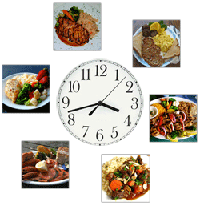Changing dietary intake to comprise the eating of smaller meals at more frequent intervals is thought to be more beneficial for weight loss than eating larger meals less frequently. This is likely due to improved control of glucose levels, better appetite control, and increased calorie use by the body during digestion. Also eating protein at regular intervals during the day increases muscle mass after exercise training, as more protein is available for repair, regeneration and growth of muscle tissue. The number of calories you burn throughout the day while at rest is largely dependent on muscle mass and a fat burning diet can be enhanced though gains in muscle. Maintaining or increasing muscle mass is a key factor in health as we age and also with survival and recovery from many disease conditions. The best results were observed when daily calorie intake was split over 5 or more meals a day. Increased fat loss as well as gains in muscle mass were noted. A high protein diet in conjunction with higher feeding frequency, has also shown beneficial effects on body composition, greater appetite control has also been observed with higher feeding frequency, with many people consuming less calories when adopting this method.
- Eat little and often (5+ small meals per day).
- Eat slowly and focus on chewing food thoroughly.
- Be careful not to exceed daily calorie intake (using a small side plate for meals can help you judge portion sizes). Also do not snack between meals.
- Keep to a balanced diet with low glycaemic index, high protein and vegetable content.
- Thick soups or healthy green smoothies fill you up more quickly with smaller portions.
- Exercise (you will see better gains in muscle mass from eating protein regularly throughout the day).

